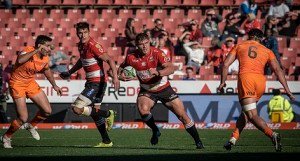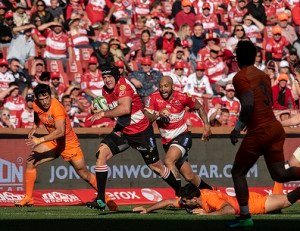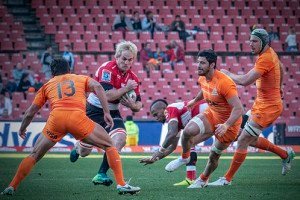Last weekend’s South African Conference SuperRugby matches just showed that the old adage of your tight five forwards winning you games remains as true as ever. For all the work we want them to do around the field these days, the set-pieces remain what teams build on.
It seems a player in the tight five’s mindset just goes if they are going backwards and are under pressure in the set-pieces and the difference between the Stormers and the Bulls in Cape Town was basically the scrums, and it was that same scrum that won Western Province the Currie Cup final last year.
Wilco Louw played his rugby as a junior at the Bulls – how and why did they let him go?! – and he is a monster who just does not get shifted at tighthead. He is certainly number one in that position in South Africa at the moment.
To have 30 000 people in at Newlands for the derby was a real positive and the Stormers were supercharged. You could just see the emotion of Robbie Fleck in the coaches’ box, he obviously knew the importance of the game, and the way a team plays is a reflection of their coaching and the Stormers were protecting a very proud recent record against the Bulls at Newlands, having won every game between them there for the last seven years.
The pressure won’t go away for the Stormers with that impressive win, but they have given themselves a chance of qualifying for the playoffs. It will now be about replicating that performance for the rest of the competition.
You have to give credit to the Stormers for the way they played, but they need a performance like that every week now. They will be a bit disappointed not to get the bonus point, they needed that because there’s not much difference between the teams on the log. Bonus points will more than likely settle matters, they are always so vital in the middle of the table, they make all the difference.
The Bulls did really well to stick in the contest, but the game hinged when the Stormers got the kickoff back straight after the Bulls went ahead 17-12 early in the second half, and scored a try to go back into the lead.
The Bulls will take away from the game that they managed to get back into contention having really been through the mincer in the first 15 minutes.
We also need to celebrate the Sharks doing so well against the New Zealand teams and they have scored an amazing number of tries against them – six against the Blues, four versus the Hurricanes and now five against the Highlanders – so they are clearly playing really good rugby. Maybe they have discovered the secret of how to play against the Kiwis, and they are certainly outscoring them, so credit to the Sharks.
Their approach has brought them reward and now they just need to look for consistency.
Some of the Sharks tries have been absolutely superb in terms of passing and clever box-kicks and to see a lock in Ruan Botha claiming the ball as the first chaser, leading to their first try against the Highlanders in the opening minute was amazing. They also scored a great try with the bridge pass over the top and another through a sublime grubber from Robert du Preez, which are all the ways to expose the wing.
The three Du Preez brothers certainly make a massive difference to the Sharks team, with the two loose forwards monstering the gain-line and Robert really controlling the game at flyhalf. It’s great to see in terms of the Springboks with Handre Pollard also playing well too, both Handre and Robert are big flyhalves who really defend their channels.
The Lions are almost indestructible on the Highveld and in South Africa in general, they’re bulletproof playing in South Africa having not lost to another local franchise in three years, but they really need to get something out of their game against the Highlanders in Dunedin this weekend. If they do then maybe they can still get a home semi-final because the Australian teams are so far behind. The Lions will be confident they can beat anyone on the Highveld and nobody will want to travel to altitude to play them, then a final away from home can always be 50/50.
The Jaguares have really improved and are in quarterfinal contention, they have a lot of home games coming up after their amazing run of winning four games on the bounce away from home. They seem to have returned to the traditional Argentinian values of a good scrum and maul.
For the Lions, Ruan Combrinck did not have the greatest game in defence, he went way too high twice and was too easily brushed off, which really cost them, and the Lions’ defence was too narrow and the Hurricanes were able to score a try by going around them inside the 22. They need better spacing there.
The Lions have kept themselves in the race to win the Conference though and they could well be in Johannesburg for the playoffs. If they are to be at home in the knockout rounds then they have to ensure that they are more accurate in the set-pieces; they lost a lineout which led directly to the Hurricanes getting seven points.
For the Wellingtonians, Ben Lam is certainly on fire … and New Zealand have just uncovered another top-class winger!
The Springbok pack is showing great potential too.
If Steven Kitshoff, Beast Mtawarira, Wilco Louw and Trevor Nyakane can replicate their performances in SuperRugby, along with the hookers we have in Adriaan Strauss, who had a huge weight on his shoulders in 2016 and is now playing with freedom, Malcolm Marx and Bismarck du Plessis, then South Africa will have a heck of a front row.
When you add in locks Lood de Jager, RG Snyman, Pieter-Steph du Toit and Franco Mostert, and Eben Etzebeth when he is fit, then we have the makings of a really good Springbok tight five. They tick all the set-piece boxes and that is still the basis of all rugby, never mind Test rugby, for all the skills people are dazzled by.
Plus I’m sure Rassie Erasmus will want to get Vincent Koch in the mix, but will he play in June at the end of a long season in England? Maybe it would be better to give him some time off before the Rugby Championship. Heyneke Meyer had a theory that it was better to play the SuperRugby guys in June and the overseas players at the end of the year, because playing all-year-round rugby is very tough.
In terms of the back row, a combination of Duane Vermeulen, Francois Louw and Jean-Luc du Preez looks really good, and then you put Siya Kolisi in the mix as well. He was superb last June – forcing turnovers, being busy around the field, chasing down kicks and making strong carries.Congratulations to him on captaining the Stormers so well in his 100th game at his beloved Newlands.
John McFarland is the assistant coach of the Kubota Spears in Japan and was the Springbok defence coach from 2012 through to the 2015 World Cup, where they conceded the least line-breaks in the tournament and an average of just one try per game. Before that, McFarland won three SuperRugby titles (2007, 09, 10) with the Bulls and five Currie Cup crowns with the Blue Bulls. In all, he won 28 trophies during his 12 years at Loftus Versfeld.



